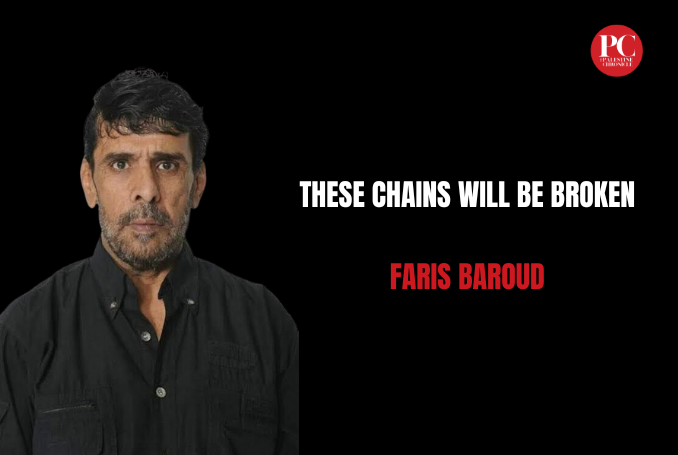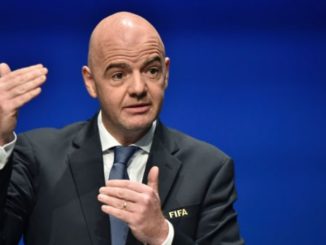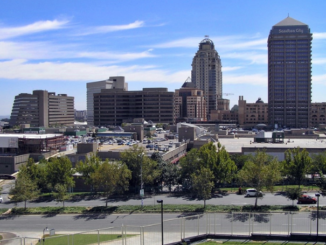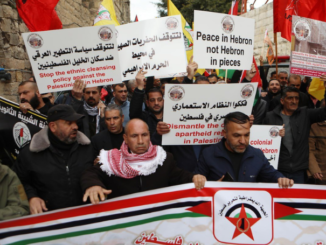
By Palestine Chronicle Staff – Gaza
Starting on Friday, November 24, a prisoner swap between the Palestinian resistance and Israel began in stages. So far, 150 Palestinian prisoners have been released from Israeli prisons.
To provide some context, The Palestine Chronicle will publish stories of Palestinian prisoners included in Ramzy Baroud’s volume ‘These Chains Will Be Broken: Palestinian Stories of Struggle and Defiance in Israeli Prisons’. (Clarity Press.)
The text below appeared in a chapter entitled ‘I See You in My Heart.
Years after his imprisonment, Faris developed kidney disease, which worsened through medical negligence, further compounded by his participation in various hunger strikes in solidarity with other prisoners.
Faris Baroud was arrested on March 23, 1991. An Israeli military court sentenced him to 134 years in prison, accusing him of killing an Israeli settler who was taking part in the military occupation of Gaza.
Ria, Faris’ mother, was forbidden to visit her son in the Nafha Prison for the last 15 years. The 70-year-old mother was told that the decision was motivated by security concerns.
Faris was Ria’s only son. He was born in 1968, two years after the start of the Israeli military occupation of Gaza. His father, Ahmad Mohammad Baroud, died when Faris was still a child. Ria, who remained unmarried after the death of her husband, dedicated her life to raising Faris. They lived together in a small home in the Shati’ Refugee Camp in Gaza.
Ria was only a teenager when her family was forced out of their village of Beit Daras in southern Palestine. Despite fierce resistance by the villagers, Beit Daras was conquered in May 1948. Hundreds of its people were killed and wounded, and thousands were expelled, mostly to Gaza. Beit Daras was entirely demolished soon after it was depopulated and is now a part of the state of Israel.
Faris was reportedly tortured and held for nearly 10 years in solitary confinement. He was also denied family visitation for more than half of his time in prison. Prior to his arrest, he suffered from asthma, a condition that worsened with time.
Years after his imprisonment, Faris developed kidney disease, which worsened through medical negligence, further compounded by his participation in various hunger strikes in solidarity with other prisoners.
Time and again, Faris was denied early release, starting immediately after the signing of the Oslo Accords in 1993 and following a prisoner exchange in 2011. Along with 29 other prisoners, he was scheduled to be set free in 2013 or 2014, in a special arrangement that was also thwarted by the Israeli government.
Starting in 2002, Ria was denied visits with her son. Despite her deteriorating health and the gradual loss of her vision due to glaucoma, she was known for never missing a single vigil that was held regularly by families of Palestinian prisoners, in front of the Red Cross office, every Monday on Gaza City’s famous Jala’ Street.
At times, she would be the only one there, always holding the same framed picture of her son, Faris, close to her heart.
I See You in My Heart
I used to wake up in the morning to your face, as your framed photo is always by the side of my mattress. But since I lost my sight, crying for you, son, I can only see you in my heart. I have so much faith that I will hold you in my arms again.
Not to worry, Faris, all thanks to Allah, I do everything on my own. I live alone, but I manage. I know where everything is and can reach everything in our house with ease. I still cook, but I no longer use the wood stove as I am scared of burning myself. So I use the gas stove. I no longer have the old one. It has been acting up, so I threw it away, and replaced it with a new one.
I try to do a lot of good deeds, son, because I believe that the more I give, the more God gives me back, by keeping you safe. I cook for myself and for the children in the neighborhood. My neighbor is a very old and poor woman. She does not have a gas stove, so I cook for her as well. All I ask in return is for people to say a prayer: “May Allah set your son free.”
All I want in this life is to see you once before I die.
I called on all Arab and foreign countries, and all of Europe, and Jordan and Syria and the whole Arab nation to help me so that you can return to me. I told them through the news media that my son has been in prison since 1991, and I have not been allowed to visit him for the last 15 years. I hope they listen to a mother’s pleas and help me.
When the Israelis told me that I am not allowed to see you, I cried until I turned blind, but I remember your handsome face exactly the way I saw you the last time we were together; it is an image that never leaves my mind.
When the prisoner exchange took place, I anticipated your release, so I bought a new bedroom set for you. It is always made up and ready. But you were not released, and I was still unable to see you. Maybe they were angry with me because of what happened the last time I came to visit you. I was climbing the stairs of the prison. It had more than 50 steps going up and 50 steps coming down. As I struggled on the ascent, I said to myself, “Oh, my son,” as I was eager to see you. An Israeli soldier started to mock me. “Are you Hamas?” he said, laughing. I told him to shut up. “Do you see me carrying a weapon?” I yelled at him. When I returned the following time, the same soldier blocked my entrance. He said: “Go home, you no longer have visitation privileges.”
It has been 15 years since I saw your face, but I have protested every week in front of the Red Cross office in Gaza, while holding your framed picture. And I thank Allah every day for you, son. Everyone who met you in prison, and is now free, came to visit me. They tell me that you are loved by everyone, and have such a good reputation. I tell them, and everyone else, that Faris is a hero. You are my hero.
Oh, how I cried for you, Faris. My eyes can only tell day from night, but nothing else. But thanks to God, thanks to God, I am content with my fate, for this is what Allah has decided for me. It is you that I am concerned about. So, I pray all day, every day. I make supplications to God so that you come back, and that I may choose your bride for you. We will throw a big party and all the neighbors and friends, all the Barouds and all the freed prisoners and their families will come and celebrate with us.
I also wrote a song for you and I sing it every time I hold my vigil in front of the Red Cross office:
They got out of jail and trashed its doors
I can’t even breathe in here, yumma
He can’t breathe and he’s torn away from his loved ones
I swear I’d knock a jailer’s teeth out
I’d break down the prison door for you, wallah with my hands
I’d knock it down
Yes, I will break the door down. I am an old woman but my will comes from my love for you and from the help of God.
I leave you with this prayer, Faris,
“Oh, Allah, free my son and all of his comrades, all in one day, Amen. Oh, Allah, you are the one who grants victory and freedom, I beseech you to grant my son his freedom. Please set Faris and all the captive young men and women free.
“Oh, Allah, oh, Allah, oh Allah, give me back my son.”
—
Ria Baroud died on May 18, 2017, at the age of 85. She spent nearly one third of her life waiting to see her son, Faris, free once more.
Soon after his mother’s death, Faris’ health took a turn for the worse. He developed an aggressive form of glaucoma as well, and had reportedly lost 80 percent of his vision.
Faris died on February 6, 2019 at the Nafha Prison in the Naqab Desert.
He was 51 years old.
Ria’s last words were “My only wish is to hold my son and kiss his forehead, just once before I die.”
Both departed this life alone, blind, to never see each other again—at least in this life.







